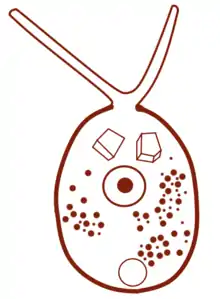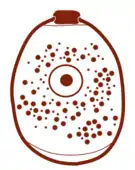Cryptodifflugia leachi
Cryptodifflugia leachi is an aquatic species of testate amoebae discovered in 2006 in Canada, living in bottom sediment from wetlands at the base of the Niagara Escarpment.[2]
| Cryptodifflugia leachi | |
|---|---|
 | |
| A free-living Cryptodifflugia leachi cell housed in its rigid shell, extending its rhizopods through the pseudostomal aperture. | |
| Scientific classification | |
| Domain: | Eukaryota |
| Phylum: | Amoebozoa |
| Class: | Tubulinea |
| Order: | Arcellinida |
| Family: | Cryptodifflugiidae |
| Genus: | Cryptodifflugia |
| Species: | C. leachi |
| Binomial name | |
| Cryptodifflugia leachi Nicholls, 2006[1] | |
Description
Cryptodifflugia leachi is characterized by an oval, elliptical shell with a circular transverse section and a smooth surface. The shell ranks as one of the smallest out of the testate amoebae, with a length of 10-16 μm, a width of 8-12 μm and a very small pseudostomal aperture of 1.5-2.5 μm in diameter.[2][1] Its pseudopodia are narrow and cylindrical, often reaching lengths up to 3 times that of the shell. Inside its cytoplasm there are often one or two large crystal-like refractive bodies in the anterior (closer to the aperture) region. When encysted, it develops an operculum, a thickened plug, and the cell membrane thickens behind it.[2]
 A free-living C. leachi cell extending its rhizopods.
A free-living C. leachi cell extending its rhizopods. An encysted C. leachi cell with a developed operculum.
An encysted C. leachi cell with a developed operculum.
References
- Bobrov, Anatoly; Mazei, Yuri (2017). "A review of testate amoeba genus Cryptodifflugia Penard, 1890 (Phryganellina: Cryptodifflugiidae) with a key to species". Zootaxa. 4282 (2): 292–308. doi:10.11646/zootaxa.4282.2.4.
- Nicholls, Kenneth H. (2006). "Cryptodifflugia leachi n. sp., a Minute New Testate Rhizopod Species (Rhizopoda: Phryganellina)". Acta Protozoologica. 45 (3): 295–299.